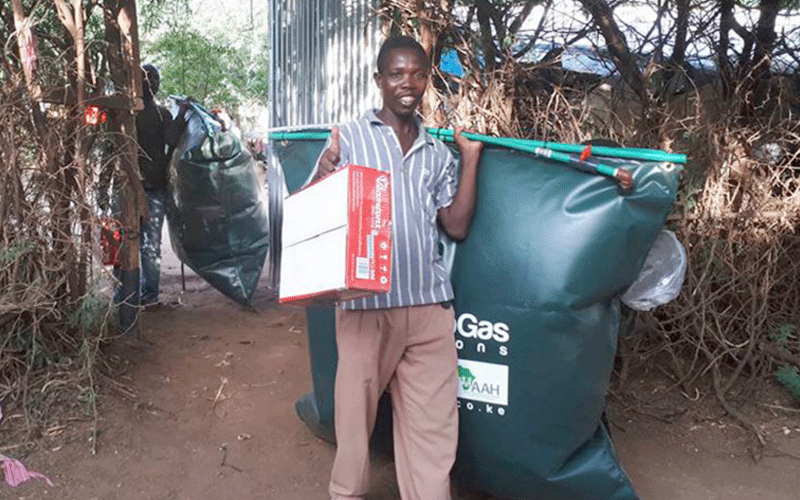Portable biogas digester built to eliminate waste

Bernard Gitau @benagitau
Uncollected solid waste is one of Nairobi’s most visible environmental problems. Subsequently, waste transportation is largely rudimentary using open trucks, handcarts, donkey carts among others.
These poor transportation modes have led to littering, making waste an eyesore.
The menace is replicated across the country as major towns do not prioritise solid waste management and have inadequate infrastructure.
With many parts of the city, especially the low and middle-income areas lacking waste collection systems, a firm in Nairobi has come up with the solution to turn market and kitchen waste into biogas.
Dominic Kahumbu founder and CEO of Flexi Biogas says his technology is simple to install, does not need construction and can be function three hours after installation.
Kahumbu has employed waste collectors from Ngong Market, who pick market waste in plastic buckets.
“I get two tonnes of waste from the market, which is negligible considering the huge amount of waste produced. The waste is ground using improvised chuff cutters,” he said.
In Nairobi, National Environment Management Authority estimates that over 2.5 million kilogrammes of waste is generated daily.
Almost 80 per cent of this, is organic and is generated in markets and kitchens.
There are over 100 private sector waste operators independently involved in various aspects of waste management, but there’s no enforcement of laws and regulations.
The Food Agricultural Organisation says one-third of agricultural produce never makes it to the grocery store shelves because they are judged to be beneath commercial standards or are just ugly. This results in an increase in organic waste in landfills.
At Flexi Biogas, the collected trash is put into a digester and heated. The digester is not a sealed tank but simply a 6m by 3m bag made of PVC tarpaulin.
“FlexiTech employs “True Cross-flow” fermentation, which means that what goes in one end is fully processed before exiting the other.
This also means that 100 per cent of the biogas is captured making it the greenest biogas plant design yet,” he said.
The Flexi Biogas system is portable and expandable.
“With our system, you do not need to own a cow. The system runs on all biodegradable materials such as any animal dung, vegetable/kitchen waste, food waste, garden weeds, market waste,” he said.
A 20Kg bucket of any waste will produce cooking fuel necessary for typical six–eight member homestead.
“This is made possible by the high level of efficiency associated with the technology where you only require a fifth of the feed-stock for the same daily gas production as conventional technologies,” he said.
Water hyacinth
After installation, the system will have usable volumes of gas within three to five days, and is normally in full production within seven to 14 days.
With successful installation of such digesters in gated community, residential areas, Kahumbu says the cost of gas and waster collector fess will be eliminated.
“All kitchen waste will be used in making biogas hence clean energy and tenants will save a lot,” he said.
In market places, Kahumbu says the technology can ease the burden of transporting waste into landfills.
“Eighty per cent of market waste is organic and can be used to produce biogas, which can be supplied to people through piping. This way, would address waste in markets,” he said.
Kahumbu said they have entered into a Memorandum of Understanding with Kisumu Market to put up a pilot project and if successful, it will be rolled out across other markets.
“We are also using water hyacinth to produce biogas. We can only manage it because it is beneficial to the ecosystem of the Lake,” he said.
With the technology, Kahumbu says, the remaining 20 per cent of plastic waste is ground and mixed with cement and soil to make construction bricks.
“We will address the organic waste and plastic waste in our environment and we are left with a small percentage of e-waste to deal with,” he said.












